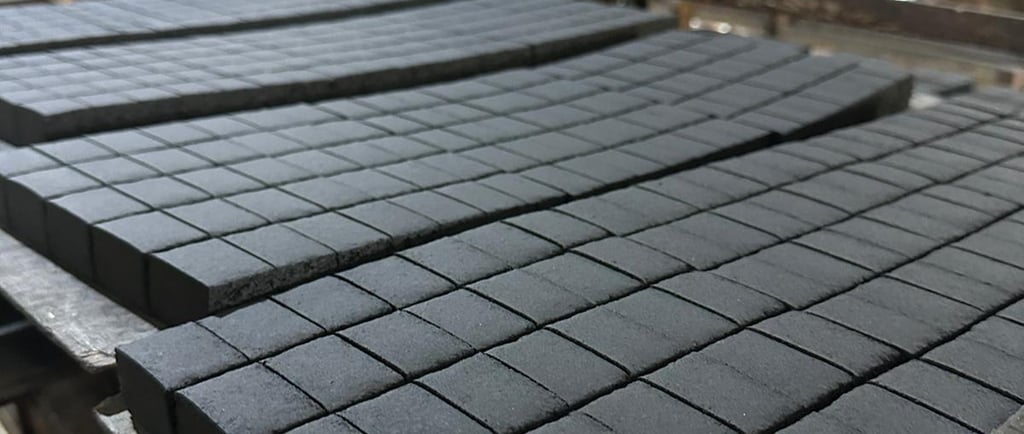The Secret to High-Quality Export Shisha Briquettes: A Complete Guide for Producers
Learn the secrets of premium export shisha briquettes. Find a complete guide on production processes, international quality standards, and tips for global market entry.
HOOKAH/SHIHA
Tropicoal Team
6/26/20254 دقيقة قراءة


In the era of globalization, the demand for high-quality shisha briquettes in the export market continues to rise. Producers in Indonesia, with their rich natural resources like coconut shells, have a significant opportunity to meet this demand. However, to penetrate international markets, shisha briquettes must meet stringent quality standards. This article will guide you through the essential steps in producing high-quality export shisha briquettes.
1. Selecting High-Quality Raw Materials: The Core Foundation
The quality of shisha briquettes heavily depends on the raw materials used. Coconut shell is the primary choice because it produces briquettes with stable heat, long burning duration, minimal ash, and an odor-neutral profile that doesn't interfere with the shisha flavor.
Choose the Best Coconut Shells: Ensure that the coconut shells you use are mature, perfectly dry, and free from contaminants like dirt or wood splinters. Certain varieties of coconut shells may possess superior characteristics.
Optimal Carbonization Process: Carbonization is the process of heating coconut shells without oxygen to produce charcoal. The temperature and duration of carbonization must be precisely controlled to yield charcoal with high fixed carbon content and low moisture and ash levels. Good quality charcoal will result in briquettes that last long and provide maximum heat.
2. Meticulous Production Process: Ensuring Consistency and Quality
Once you have high-quality coconut shell charcoal, the next step is the meticulous briquette production process:
Charcoal Grinding (Crushing): The coconut shell charcoal is ground into a fine powder with uniform particle size. Consistent particle size will result in dense briquettes that are not easily crumbled.
Mixing with Binder (Mixing): The charcoal powder is mixed with natural binders such as tapioca starch or cassava starch in the correct proportion. The amount and type of binder will affect the hardness, adhesion, and ash residue of the briquettes. Experimentation to find the optimal ratio is crucial.
Adding Additives (Optional): Some manufacturers add other natural ingredients like sugarcane extract or molasses in small amounts to enhance aroma or provide a subtle sweetness (according to target market preferences).
Briquette Molding (Briquetting): The charcoal and binder mixture is then pressed into various shapes (cubes, fingers, hexagonal) using a high-pressure briquette machine. The right pressure is essential to produce dense and durable briquettes. Ensure molds are clean and well-maintained for uniform briquette shapes.
Briquette Drying: The molded briquettes must be thoroughly dried to reduce moisture content. The drying process can be done naturally (sunlight) or using a drying oven with controlled temperature and time. Incomplete drying can cause briquettes to become brittle or moldy.
Briquette Curing: Some manufacturers perform an additional curing process after drying to increase the strength and durability of the briquettes.
3. Strict Quality Control: Export Standards Must Be Met
To meet export standards, rigorous quality control must be applied at every stage of production:
Raw Material Inspection: Ensure incoming coconut shell charcoal meets specified quality parameters (moisture, ash, fixed carbon content).
Production Process Monitoring: Regularly monitor carbonization temperature, charcoal particle size, mixing ratio, pressing pressure, drying temperature, and time.
Final Product Testing: Conduct tests on the finished briquettes to ensure they meet export standards:
Burn Time: Test how long the briquette can produce stable heat. Export standards are usually over 60 minutes for a single standard-sized briquette.
Ash Content: Measure the amount of ash produced after burning. Too much ash can disrupt the shisha experience. Export standards are typically below 2.5%.
Moisture Content: Ensure briquette moisture content is very low (usually below 5%) to prevent mold and ensure optimal burning.
Hardness & Durability: Test the briquette's strength against impact and pressure. Export briquettes must not crumble easily during transportation.
Smoke & Odor Emission: High-quality briquettes produce minimal smoke and do not emit unpleasant odors when burned.
Size & Shape: Ensure briquette size and shape are uniform according to target market standards.
4. Safe and Attractive Packaging: Reflecting Quality
Packaging not only protects the briquettes during shipping but also serves as a visual attraction:
Primary Packaging: Briquettes are typically packed in airtight packaging (plastic or aluminum foil) to prevent moisture.
Secondary Packaging: Primary packaging is then placed into strong, attractively designed carton boxes with clear product information (product name, size, weight, quantity, usage instructions, origin).
Labeling: Labels must be clear, informative, and comply with the requirements of the destination country (language, manufacturer information, certifications if any). Consider attractive label designs that differentiate your product from competitors.
5. Export Certifications: Building Trust and Meeting Regulations
Having relevant certifications will significantly help in penetrating export markets:
Certificate of Analysis (CoA): Issued by an independent laboratory to verify your product's quality.
Material Safety Data Sheet (MSDS): Product safety information.
Certificate of Origin (COO): Proof of the product's country of origin.
Sustainability Certifications (if relevant): Appealing to environmentally conscious markets.
ISO 9001: Certification of your company's quality management system.
Halal Certification (if targeting Muslim markets).
6. Understanding Export Market Regulations: Key to Success
Each country has different import regulations regarding charcoal products. Conduct thorough research on the quality standards, packaging requirements, labeling, and documentation needed by your target export country. Compliance with regulations will ensure smooth customs processes and avoid future issues.
Conclusion
Producing export-quality shisha briquettes is a journey that demands precision, dedication, and a deep understanding of global standards. By diligently adhering to the guidelines outlined above and embracing continuous innovation, Indonesian producers are well-equipped to not only meet but exceed the rigorous demands of the international market. Ultimately, it is this unwavering commitment to superior quality that defines success and paves the way for lasting partnerships in the competitive shisha briquette export industry. For more in-depth insights into sourcing and understanding premium charcoal and briquettes, keep exploring Tropicoal.id's blog.


